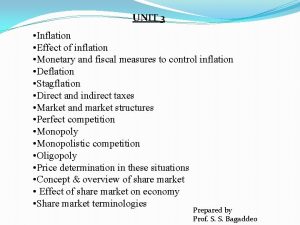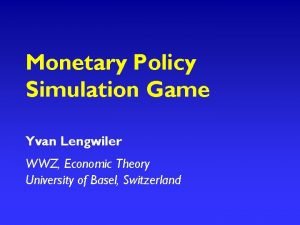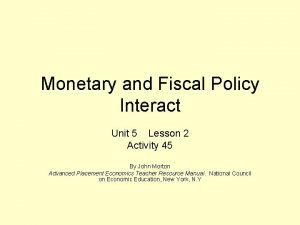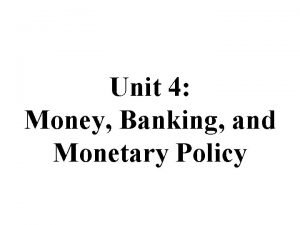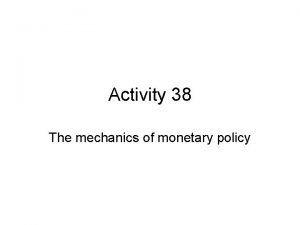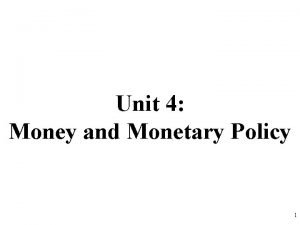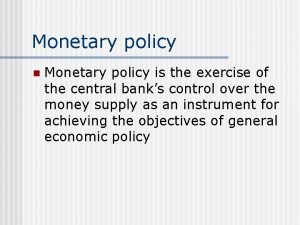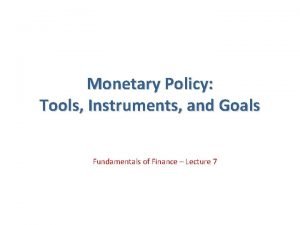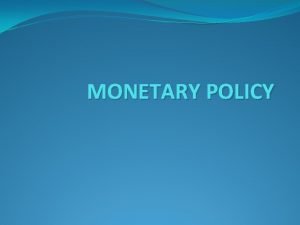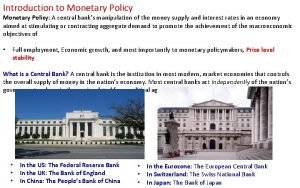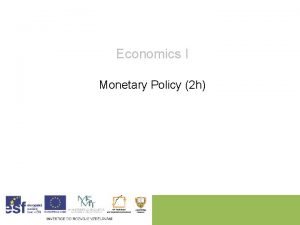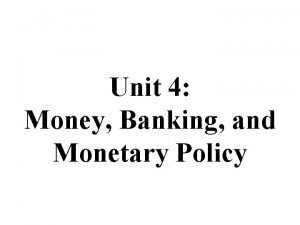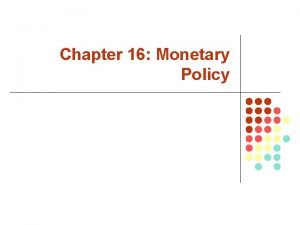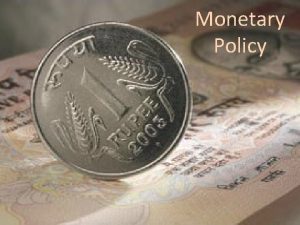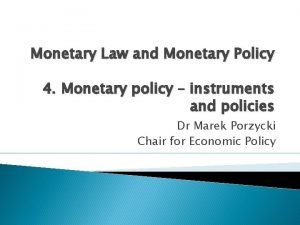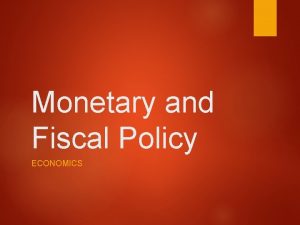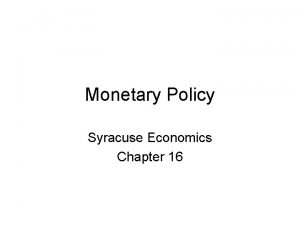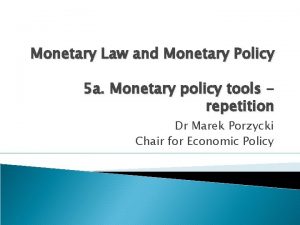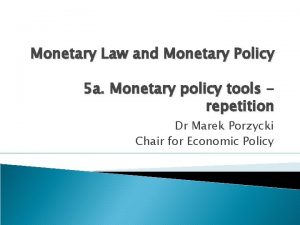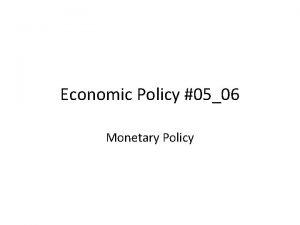Economics I Monetary Policy 2 h Monetary Policy












- Slides: 12

Economics I Monetary Policy (2 h)

Monetary Policy • The aim of the lecture is to analyze the monetary policy of the central bank, to define the objectives and instruments used to influence key macroeconomic variables, to distinguish the expansive and restrictive type of monetary policy and explain the effects of concrete instrument of monetary policy. The objectives of the state, which are monitored within the monetary policy, are part of the macroeconomic policy and represent partial steps to the achievement of the basic objectives of macroeconomic stabilization policy. There are three basic areas in monetary policy: the control of the amount of money in the economy, the regulation of interest rates and setting conditions for lending.

Content • introduction – defining the goals • monetary policy, its objectives and instruments • types of monetary policy • the effects of expansionary and restrictive monetary policy on the economy • Keynes transmission mechanism • central bank dilemma • monetary policy instruments of the Czech National Bank • conclusion – summary, homework

Monetary policy, its objectives and instruments • the assumptions for monetary policy performing • the monetary policy – one of all central bank functions • the objectives of monetary policy: the influence of employment and the general price level, the unity of the objectives is important within the overall national economic policy. • direct instruments: – liquidity rules, – credit contingents, – mandatory deposits, – recommendations, challenges and agreements.

• indirect (market) instruments: – reserves requirements (RR), – open market operations (OMO), – discount rate, – re-rebate bills and lombard loan, – conversion of currency and swap transactions, – CB intervention at foreign exchange markets (see currency policy). Czech National Bank. The monetary policy instruments. Available at WWW: http: //www. cnb. cz 5

Expansive and restrictive monetary policy • expansive: SM • restrictive: SM changes at money market • central bank dilemma o the central bank can either control the money supply or interest rate o the CB is not able to manage both at the same time, and this fact is known as the dilemma of the central bank 6

Keynesian transmission mechanism - asumming an output gap SM i I AD Y u „cheap credit policy “ + asumming price stability The effect of monetary expansion depends on whether the actual product is below or above the potential product + it is necessary to distinguish short-term and long-term perspective. 7

• Keynesian concept of expansive monetary policy assume the apparent effect of liquidity: SM i + the economy is below the potential output - Keynesian macroeconomic equilibrium approach • M. Friedman's Monetarism questions the effect of liquidity: the growth of output and the price level will cause an increase in money demand + there is an influence of inflation expectations), assuming the economy is at the level of potential output - that is the classical concept of macroeconomic equilibrium 8

Expansive monetary policy in the long run P P 3 P 2 P 1 LRAS SRAS´ SRAS E 3 E 1 Y* SM E 2 AD 1 AD There is the growth of price level and nominal product; real output and real interest rates unchanged. Y 9

Literature • FRANK, R. H. , BERNANKE, B. S. Principles of Macroeconomics. 3 rd Edition. Mc. Graw. Hill/Irwin: NY, 2007. ISBN 978 -0 -07 -319397 -7. 561 p. • MANKIW, G. N. Principles of Macroeconomics. 4 th ed. USA: Thomson South. Western, 2007. 583 p. ISBN 978 -0 -324 -23695 -8. • Mc. CONNELL, C. R. , BRUE, S. L. Economics: Principles, Problems, and Policies. 17 th ed. NY: Mc. Graw/Irwin. 716 p. ISBN 978 -0 -07 -312663 -0. • SAMUELSON, P. A. , NORDHAUS, W. D. Economics. 15 th ed. Mc. Graw-Hill, 1995.

Internet Sources • Czech National Bank. The monetary policy instruments. Available at www: http: //www. cnb. cz.

Homework Exercise “Monetary Policy” 1. Using the AS/AD model graph the restrictive monetary policy in the form of increasing reserve requirements (RR). Evaluate the impact on the economy. Discuss the change in the money market and draw this change. 2. Using the AS/AD model graph the expansionary monetary policy in the form of purchase of securities by the central bank. Evaluate the impact on the economy. Discuss the change in the money market and draw this change. 3. Find the website of the Czech National Bank (http: //www. cnb. cz) to determine changes in setting its basic market (indirect) instruments for the last 2 years. What kind of monetary policy has been conducted by the Czech National Bank?
 Cost-push inflation
Cost-push inflation Monetary policy simulation game
Monetary policy simulation game Money market graph expansionary monetary policy
Money market graph expansionary monetary policy Unit 4 money banking and monetary policy
Unit 4 money banking and monetary policy Monetary policy baseline
Monetary policy baseline Unit 4 money and monetary policy
Unit 4 money and monetary policy Instruments of monetary policy
Instruments of monetary policy Three tools of monetary policy
Three tools of monetary policy Objectives of monetary policy
Objectives of monetary policy Example of medium of exchange
Example of medium of exchange Moral suasion central bank
Moral suasion central bank What are the objectives of monetary policy
What are the objectives of monetary policy Unit 4 money banking and monetary policy
Unit 4 money banking and monetary policy
